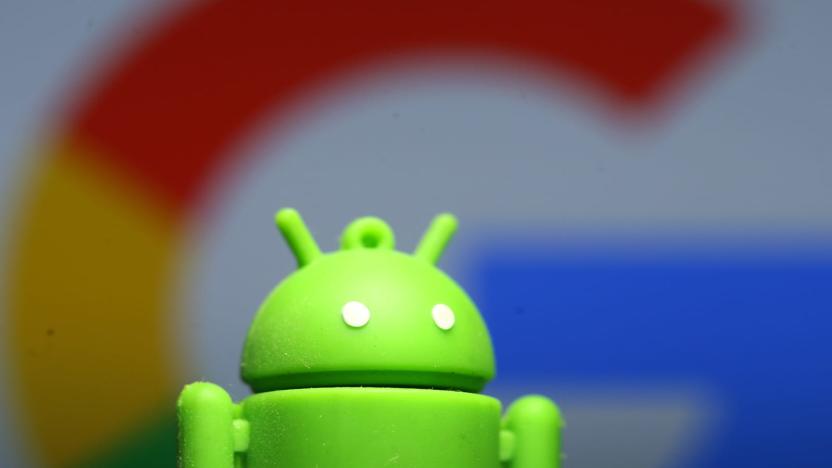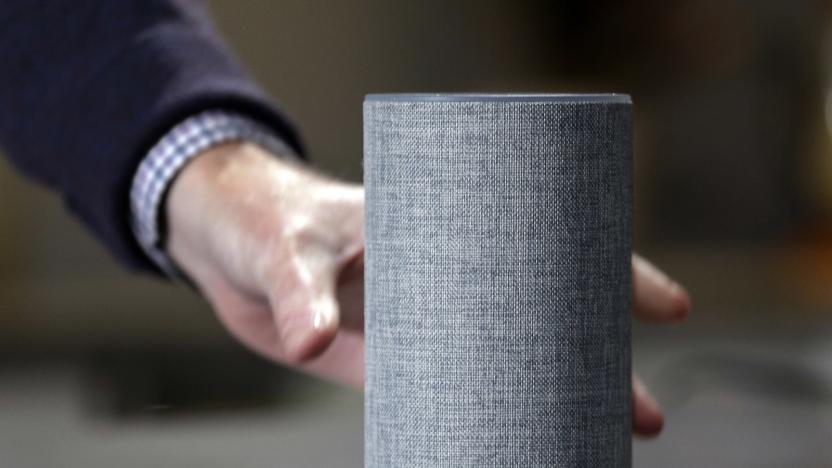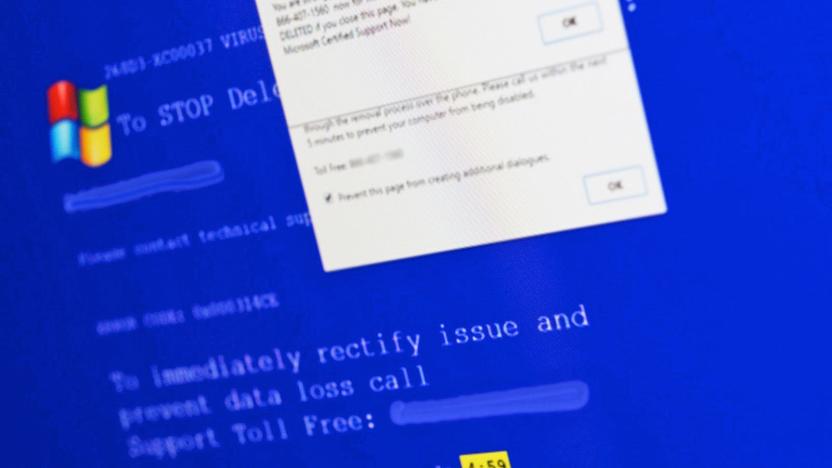scam
Latest

Facebook is already awash with fraudulent ads about its own cryptocurrency
Facebook revealed its cryptocurrency plans just a month ago, and already it's the subject of a wave of fraudulent ads. As The Washington Post reports, around a dozen fake accounts, pages and groups have appeared on Facebook and Instagram, presenting themselves as official hubs for Facebook's not-yet-available Libra currency.

Facebook introduces a scam ad reporting tool in the UK
Facebook has launched a new reporting tool designed to tackle scam ads. The feature lets UK Facebook users flag online ads that link to dubious get-rich-quick schemes or questionable cryptocurrency sales, which will then be reviewed by a dedicated anti-scam team. Facebook has also earmarked £3 million for anti-scam initiatives run by financial charity, Citizens Advice.

The FBI wants help from victims of QuadrigaCX's cryptocurrency collapse
Remember that wild cryptocurrency story from earlier this year? The one where a Canadian exchange shut down shortly after co-founder and CEO Gerald Cotten died, claiming he was the only one who could access its wallets. Wallets that should've stored assets for 76,000 customers with a value of around $200 million (CAD). If any of that was your digital money then yeah, you probably do remember. Investigations into the company, QuadrigaCX, have suggested it did not have the money to satisfy its deposits, and naturally, law enforcement is sniffing around. Its customers were located around the world, and the FBI is circulating a form for customers to get in touch with it, the IRS, the Washington D.C. AG's office and the DoJ's Computer Crime and Intellectual Property Section.

Drake sparks hundreds of fake eBay listings for Steph Curry's hair lint
Aubrey Graham, better known to the world as Drake, is basically a human meme. He has this uncanny ability to make people on the internet want to turn anything he does into viral content. Drake also happens to be an ultimate troll. Last night, during game one of the 2019 NBA Finals between the Golden State Warriors and Toronto Raptors, he exchanged some words with superstar Steph Curry. As that was happening, Drake seemingly took a moment to pull lint out of Curry's hair. That may seem strange, but you should know that Drake has Curry's number tattooed on his arm. Yes, even though he's a Raptors fan. After the game, which the Raptors won, Drake then had an exchange with another Warriors player: Draymond Green, who was on the receiving end of something along the lines of "you're trash."

Bots have invaded Instagram comments
The last thing I expected to find on Instagram was someone telling me not to look at their Story if I didn't want to masturbate. But that comment, which I can only assume was intended reverse psychology, wasn't just directed at me. It was left on a post from Sky Sports and, thanks to the thousands of likes garnered by the comment, it was the first thing the account's 2.7 million followers would see when they looked at the comments on that picture. There are similar comments all over Instagram, particularly on high-profile pages with millions of followers. And they have one thing in common: They're spam profiles with pictures and videos of naked and half-naked women, which were created to get you to look at their accounts and then have you sign up for shady pornographic sites.

Google pulls 29 photo apps that stole pictures and promoted scams
Google still has to deal with malicious Android apps slipping through the cracks despite improvements in its screening technology, and some of the offenders are worse than others. Case in point: the company recently pulled 29 camera and photo apps from the Play Store after it became clear they were meant to push intrusive ads, scam users and even steal content. Multiple apps will push full-screen ads, including porn, and some will use the opportunity to run phishing scams that steal your personal info under the guise of contests. Another group of camera apps were ostensibly meant to beautify your photos, but really just stole the uploaded pictures and gave users a fake update prompt.

Facebook will do more to tackle scam ads following defamation lawsuit
UK TV personality Martin Lewis has dropped his defamation lawsuit against Facebook after the company pledged to step up its fight against scam ads. Lewis -- who dishes out personal finance advice on UK morning shows and is the co-founder of the MoneySavingExpert consumer website -- launched his legal action against the social network in April of last year. He said that over 1,000 fake adverts had appeared on Facebook bearing his face or name, many of them crypto scams.

Alphabet made a quiz to help you detect phishing scams
For decades, phishing has proven an effective method for attackers to dupe just about anyone into clicking on malicious links so they can wreak havoc on personal and professional lives. Just ask John Podesta, Hillary Clinton's 2016 campaign chief. Phishing scams can be tricky to spot, and Alphabet hopes to help you figure out whether links in your emails genuinely will lead to untold riches or help you lose weight with a magic pill (hint: probably not).

T-Mobile starts verifying callers to fight spam
More US carriers are taking steps to prevent junk calls from reaching your phone. T-Mobile has launched a Caller Verified system that uses new standards (SHAKEN and STIR) to fight caller ID spoofing and ensure the number you see is real. Ideally, this makes it harder for ad spammers and tech support scammers to dodge screening efforts and blacklist apps.

Fake Alexa setup app is topping Apple's App Store charts
If you received a new Alexa device over the holidays and are working on setting it up, be warned that a fake Alexa setup app has been making its way up Apple's App Store charts. The app is called "Setup for Amazon Alexa" and it's from a company called One World Software that, as 9to5Mac points out, has two other shady apps in the App Store as well. As of writing, the app was ranked at #75 in the "Top Free" apps list and #6 in the list of top utilities apps.

FTC issues warning about a Netflix phishing scam
In between bouts of binge watching, keep a close eye on any emails you get that claim to be from Netflix. The Federal Trade Commission issued a warning today about fake messages claiming to be from the streamer that are really just trying to snag your login info or distribute malware. The screenshot shared came from Ohio police, but the message used British English spelling, and the UK's Action Fraud service gave a similar warning a few months ago.

FBI and Google dismantle multi-million dollar ad fraud scheme
A massive ad-fraud operation that hijacked nearly two million devices and involved 5,000 counterfeit websites has been dismantled by the FBI, Google and bot-detection firm White Ops. The eight men involved in the scheme are facing charges -- three have been arrested and five remain at large.

Half of phishing sites trick you into thinking they're 'secure'
You can't assume that a site is honest because it has that "secure" padlock in the address bar, and PhishLabs just illustrated why. The anti-phishing company has determined that 49 percent of all known phishing sites used Secure Sockets Layer protection (and thus displayed the padlock) as of the third quarter of 2018. That's a sharp rise from 35 percent in the second quarter, and a steep climb from 25 percent a year earlier. They'll still try to trick you into handing over vital details -- it's just that their web traffic will be encrypted while they do it.

Police arrest alleged Russian hacker behind huge Android ad scam
Police in Bulgaria have arrested an alleged Russian hacker who may be responsible for a huge Android ad scam that netted $10 million. The individual identified as Alexander Zhukov is a Saint Petersburg native who's been living in Varna, Bulgaria, since 2010 and was apprehended on November 6th after the US issued an international warrant for his arrest, according to ZDNet.

Twitter expands its reporting options for spam tweets and accounts
Until now, Twitter's reporting process has offered limited options for you to let the company's staff know exactly why you're flagging iffy tweets. That changed somewhat on Wednesday, as you can specify the type of spam you're drawing attention to when you report a tweet.

eBay now verifies the authenticity of luxury watch sales
eBay's Authenticate program now covers more than high-style handbags. The online shopping giant now verifies the authenticity of luxury watch sales from more than 30 luxury brands, including Audemars Piguet, Breitling, Patek Philippe and Rolex. Sellers who pass muster will receive an "authenticity verified" badge that makes clear the watches they sell are the real deal. That's rather important when watches like Audemars' Royal Oak or Patek's Nautilus can easily cost tens of thousands of dollars.

FTC investigates $700,000 crowdfunding campaign for fraud
The FTC hasn't publicly investigated crowdfunding fraud outside of one case, but that doesn't mean it's inactive. The Verge has learned that the Commission is investigating Doug Monahan's crowdfunding campaigns for the iBackPack, a smart backpack that included a mobile hotspot, battery pack and connectors. Monahan raised over $700,000 between Indiegogo and Kickstarter in 2015 and 2016, but hasn't shipped the backpack in question. Supporters only ever received pre-release accessories, and the Kickstarter campaign's last news update was in March 2017.

Making a living scamming the scammers
"Well, my grandchildren were over and it's something about a pornography virus," says the soft voice of an elderly woman over the phone. "I unplugged my computer right away," she continues, and after she explains her worries in a little more detail, a female voice on the other end of the line replies, "That's all right. Don't worry, let me assist you with this. And may I know, is that a desktop or a laptop?" The PC has apparently been hacked, as confirmed by allowing the support team remote access, but resolving this comes at a cost. Nearly two hours and 20 minutes -- and several transfers between call center staff -- later, Kitboga drops the vulnerable-old-lady act.

Phishing scam targets iPhone users with a fake call to ‘Apple Care’
As more and more people use their mobile devices for everyday computing tasks, it makes sense that there would be more attacks. The latest phishing attempt, discovered over at Ars Technica, involves a false webpage that initiates a call on your iPhone. According to the site, when they made the call, they were connected to a fake representative who said he was "Lance Roger from Apple Care." The person quickly hung up as the reporter tried to stall and get more detail on the scam.

SEC halts sketchy Kodak-branded cryptocurrency mining scheme
One of the more surprising gadgets to appear at CES this year was a Kodak-branded cryptocurrency mining computer, which might have seemed like an easy way to make money if you leased the machine. But economists said the math never added up, and the proposed profits were nigh-on impossible. Spotlite, the company behind the plan, now says it will not move forward with leasing the machines. CEO Halston Mikail told the BBC that the Securities and Exchange Commission had blocked the scheme.








